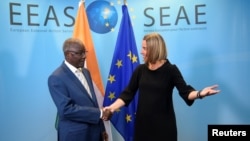A joint military force to fight jihadists and organized crime in the Sahel has chalked up successes but promised funding is slow to materialize, the foreign minister of Niger said on Monday.
"The strength of the G-5 Sahel force has become a reality even if not all the funding has been disbursed," said Kalla Ankourao, whose country is assuming the rotating presidency of the group. The force also includes Burkina Faso, Chad, Mali and Mauritania.
Originally intended to become fully operational in mid-2018, the G-5 Sahel force operates alongside France's 4,000 troops in the troubled "tri-border" area where Mali, Niger and Burkina Faso meet.
As well as fighting militants, the G-5 tackles smuggling and illegal immigration networks that operate in these vast, remote areas on the Sahara's southern fringe.
The success of these operations has become pivotal to the EU, where divisions are deepening on how to address the flow of African migrants trying to illegally enter Europe.
The group also works alongside the UN's 12,000-strong MINUSMA peacekeeping operation in Mali.
"The force has already had clashes with jihadist groups in the area," said the Nigerien minister.
Ankourao spoke at a press briefing in Brussels with European foreign affairs chief Federica Mogherini, who regretted that some non-EU donors were slow to deliver on their commitments.
"The European Union has disbursed its 100-million-euro share of the 414 million euros" ($480 million) that were pledged at a donors' conference in February, Mogherini said.
European funding had made it possible to launch operations, she said. She did not identify the payment laggards.
Major contributions so far have been pledged by the Saudi Arabia (100 million euros / $119 million); the G5 members (50 million euros, consisting of 10 million euros apiece); United States ($60 million) and the United Arab Emirates (30 million euros).
The G-5 Sahel force is scheduled to ultimately pool 5,000 troops from the five countries.
A European source said soldiers of the joint force had already tightened controls on remote desert routes used by migrant smugglers to reach Libya.
This had pushed the traffickers to a new road towards Algeria and Spain, the source said.
Intercepted migrants were mostly from Nigeria, Ivory Coast, Gambia and Guinea. Burkina Faso and Niger are transit countries.
But populations in northern Niger are involved in trafficking, the minister said.
"We must help the people of the Agadez region [in the north of Niger] who do not want to go into terrorism or migration activities to find income," the Nigerien minister said.









